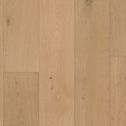The Essential Bedroom Flooring Guide
The bedroom is more than just a space for sleep; it's a personal sanctuary where we retreat after a long day. As such, it's crucial to curate an inviting and cozy ambience that reflects your personal style and promotes relaxation. One key element in achieving this is selecting the right flooring for your bedroom. In this comprehensive guide, we will explore various flooring options and colours that work well in bedrooms, empowering you to create the perfect bedroom retreat.
What Factors Should You Consider When Choosing Bedroom Flooring?
Choosing the right flooring for your bedroom is important as it can greatly affect the overall look and feel of the space. When selecting the perfect bedroom flooring, there are various factors to consider to guarantee its functionality and aesthetic appeal.
Size and layout
First and foremost, the size and layout of your bedroom play a critical role in determining the ideal flooring option. Large bedrooms might suit a hardwood flooring option with a rug while a smaller bedroom may benefit from a plush carpet, creating a cosy and snug space.
Personal Style
Your style and the overall design of your home will be key element when selecting your flooring option. You might want to keep your flooring the same throughout the house to give it a consistent look and feel or you might want to use carpet to create a cosy and relaxing space.
Underfoot comfort
It's also important to consider the comfort and warmth underfoot in your bedroom, having a hardwood or laminate flooring option will be cooler underfoot (especially in the middle of the night) compared to a carpeted bedroom. If you live in a cold climate area the best option might be to have carpet in your bedroom so your feet are warm!
Benefits of different types of bedroom flooring
Hardwood Flooring
Pros:
1. Aesthetics: Hardwood flooring adds a timeless and elegant look to any room, including the bedroom. It can enhance the overall aesthetic appeal and create a warm and inviting atmosphere.
2. Durability: Hardwood floors are known for their durability and can last for many years with proper care. They can be sanded and refinished, extending their life.
3. Easy to clean: Hardwood floors are relatively easy to clean and maintain. They can be swept, vacuumed, or mopped to remove dust and dirt, making them a convenient choice for the bedroom.
4. Allergy-friendly: Hardwood floors do not trap allergens like dust mites, pet dander, or pollen, making them a better option for individuals with allergies or respiratory sensitivities.
5. Versatility: Hardwood flooring comes in various species, colours, and finishes, allowing you to choose the one that matches your bedroom decor and personal style preferences.
6. Increased home value: Hardwood flooring is highly desirable and can increase the value of your home. It is considered a premium feature that appeals to potential buyers.
Cons:
1. Cost: Hardwood flooring can be more expensive than other types of flooring, both in terms of material and installation. The cost can vary depending on the wood species, quality, and the size of the bedroom..
2. Noise: Hardwood floors can create more noise compared to other flooring options. Footsteps, furniture movement, and other activities can generate sound that may be more audible in the bedroom. Area rugs or sound-absorbing underlayment can help mitigate this issue.
3. Maintenance: Hardwood floors require regular maintenance to keep them looking their best. This may include refinishing, sanding, or applying protective coatings periodically, depending on the wear and tear.
4. Hardness: Hardwood floors can be hard underfoot, which may not be ideal for everyone. Some people prefer a softer surface in their bedroom, especially if they spend a lot of time walking or standing in the room.
It's important to weigh these pros and cons in relation to your specific needs, preferences, and budget before deciding whether hardwood flooring is the right choice for your bedroom.
LVT Flooring
Luxury Vinyl Tile (LVT) flooring has gained popularity as a versatile and cost-effective option for various rooms, including bedrooms. Here are some pros and cons of LVT flooring in the bedroom:
Pros:
1. Affordability: LVT flooring is generally more affordable compared to hardwood or other natural flooring materials. It offers a budget-friendly alternative that can mimic the look of wood, stone, or other premium materials.
2. Durability: LVT flooring is highly durable and resistant to scratches, stains, and dents. It is suitable for high-traffic areas, making it a good choice for bedrooms where foot traffic is common.
3. Moisture resistance: LVT is waterproof, making it suitable for areas prone to moisture, such as bathrooms or bedrooms with en-suite bathrooms. It can withstand spills and moisture without warping or damage.
4. Easy maintenance: LVT flooring is easy to clean and maintain. Regular sweeping, vacuuming, and occasional mopping are usually sufficient to keep it looking its best. It does not require refinishing or sealing like hardwood.
5. Comfort underfoot: LVT flooring can provide a softer and more comfortable surface compared to hardwood or tile. It has some level of cushioning and can help reduce fatigue when walking or standing in the bedroom.
6. Wide range of designs: LVT comes in a vast array of designs, patterns, and colours. It can mimic the appearance of natural materials like wood or stone, allowing you to achieve the desired aesthetic for your bedroom.
Cons:
1. Limited lifespan: While LVT flooring is durable, it may not have the same long lifespan as hardwood or other natural materials. Over time, wear and tear can cause the top layer to show signs of fading or damage.
2. Visual authenticity: While LVT can replicate the look of natural materials, it may not have the same level of authenticity and depth as the real thing. Some people may prefer the genuine texture and feel of natural hardwood or stone.
3. Limited repair options: In the event of damage or wear, repairing LVT flooring can be challenging. Unlike hardwood, which can be sanded and refinished, damaged LVT tiles may need to be replaced entirely, potentially requiring more time and expense.
4. Sound transmission: LVT flooring can transmit more sound compared to materials like carpet. It may amplify footsteps or other noises, which can be a consideration for those who value sound insulation in the bedroom. However, installing an acoustic underlay can reduce noise.
Considering these pros and cons can help you determine whether Luxury Vinyl Tile flooring is suitable for your bedroom, based on your budget, desired aesthetic, and specific needs.
Laminate Flooring
Laminate flooring is a popular choice for many homeowners due to its affordability and versatility. Here are some pros and cons of using laminate flooring in the bedroom:
Pros:
1. Affordability: Laminate flooring is typically more budget-friendly compared to hardwood or natural stone flooring. It offers a cost-effective option for achieving the look of more expensive materials.
2. Durability: Laminate flooring is highly durable and resistant to scratches, dents, and fading. It can withstand heavy foot traffic and is suitable for active bedrooms.
3. Easy maintenance: Laminate flooring is easy to clean and maintain. Regular sweeping or vacuuming, along with occasional mopping, is usually sufficient to keep it looking clean and fresh.
4. Versatility in design: Laminate flooring comes in a wide range of designs, patterns, and colors. It can mimic the appearance of various materials like hardwood, stone, or tile, allowing you to achieve the desired aesthetic for your bedroom.
5. Installation ease: Laminate flooring often features a click-and-lock or tongue-and-groove installation system, making it relatively easy to install. This can save time and money if you choose to install it yourself.
Cons:
1. Limited refinishing options: Unlike hardwood, laminate flooring cannot be sanded or refinished. If the surface gets deeply scratched or damaged, the affected plank will typically need to be replaced.
2. Sound and feel: Laminate flooring can produce a hollow or echoing sound when walked upon, which some people may find less desirable compared to the solid feel of hardwood or carpeting. However, the addition of underlayment can help mitigate this issue.
Considering these pros and cons can help you determine whether laminate flooring is suitable for your bedroom based on your budget, desired aesthetic, and specific needs.
Tiles
Using tile for bedroom flooring can offer a unique and stylish look. However, it also has its own set of pros and cons. Here are some of the pros and cons of using tile in bedroom flooring:
Pros:
1. Durability: Tile is highly durable and long-lasting. It can withstand heavy foot traffic, resist scratches, and is less prone to wear and tear compared to other flooring options.
2. Easy maintenance: Tile flooring is relatively easy to clean and maintain. It is resistant to stains and can be easily wiped or mopped clean. Spills and accidents are less likely to cause permanent damage.
3. Variety of styles and designs: Tiles come in a wide range of styles, colors, patterns, and textures. You can choose from ceramic, porcelain, or natural stone tiles to achieve the desired aesthetic for your bedroom.
4. Allergy-friendly: Unlike carpets, tile flooring does not trap allergens such as dust mites, pollen, or pet dander. This can be beneficial for individuals with allergies or respiratory sensitivities.
5. Coolness: Tile flooring has a natural coolness that can be refreshing in warmer climates or during the summer months. It can help maintain a comfortable temperature in the bedroom.
6. Resistant to moisture: Tile is highly resistant to moisture, making it suitable for areas like bathrooms or bedrooms with en-suite bathrooms. It can withstand water spills or humidity without warping or damage.
Cons:
1. Hardness: Tile flooring can be hard underfoot, which may not be comfortable for everyone, especially if you spend a lot of time walking or standing in the bedroom. Adding area rugs or using underfloor heating can help mitigate this issue.
2. Coldness: While the coolness of tile can be advantageous in warmer climates, it can also make the bedroom feel colder during colder seasons. Proper insulation and the use of rugs or area carpets can help provide warmth.
3. Noise transmission: Tile flooring can amplify sound and echo in the room, making footsteps or other noises more audible. This can be a consideration for those who value sound insulation in the bedroom.
4. Professional installation: Installing tile flooring typically requires professional expertise and specialized tools. Improper installation can result in uneven surfaces or cracked tiles.
5. Cost: Tile flooring can be more expensive than other flooring options, especially if you choose natural stone tiles or intricate patterns. Additionally, the cost of installation and labor should be considered.
6. Hard and slippery when wet: Tile flooring can become slippery when wet, posing a potential risk of slips and falls. It is important to take precautions and use rugs or mats in areas prone to moisture.
Considering these pros and cons can help you determine whether tile flooring is suitable for your bedroom based on your preferences, budget, and specific needs.
Kids Bedrooms
When choosing flooring for a kids' bedroom, it's important to consider several factors to ensure a safe and functional space. Here are some things to consider:
1. Durability: Kids' bedrooms can be high-traffic areas, so choose a flooring material that is durable and can withstand the activities and playtime of children. Consider options that are resistant to scratches, stains, and wear.
3. Ease of maintenance: Kids are notorious for making messes. Opt for flooring that is easy to clean and maintain, as it will likely require regular cleaning. Stain-resistant materials or those that can be easily wiped or mopped clean are ideal.
4. Comfort: Since children spend a significant amount of time playing on the floor, consider flooring options that offer comfort underfoot. Softer materials like carpet, can provide cushioning and make the space more comfortable for play.
5. Allergies and cleanliness: If your child has allergies or respiratory sensitivities, consider flooring options that are hypoallergenic and easy to keep clean. Materials like hardwood, laminate, or vinyl that do not trap allergens are preferable over carpet, which can accumulate dust and allergens.
6. Acoustic properties: Kids can be noisy, and having flooring that helps absorb sound can be beneficial, especially if the bedroom is located above or near living spaces. Carpet, cork, or acoustic underlay can help minimize noise transmission.
7. Design and aesthetics: Consider the design and aesthetics of the flooring to match the overall theme or style of the kids' bedroom. Involve your child in the decision-making process to ensure they feel involved and happy with the chosen flooring.
8. Budget: Set a budget for the flooring project and explore options that fit within your financial constraints. Keep in mind that some flooring materials, such as hardwood or natural stone, tend to be more expensive than others.
9. Installation: Consider the ease of installation and any associated costs. Some flooring options may require professional installation, while others can be installed as a DIY project.
Bedroom Inspiration
In conclusion, choosing the right flooring for your bedroom is a crucial decision that can greatly impact the overall look, feel, and functionality of the space. Consider factors such as the size and layout of your bedroom, your personal style, and the level of comfort you desire.
Hardwood flooring offers timeless elegance and durability, but it comes at a higher cost and requires regular maintenance. Luxury Vinyl Tile (LVT) flooring provides a budget-friendly option that mimics the look of natural materials while being highly durable and easy to maintain. Laminate flooring offers affordability and versatility. Carpet provides comfort, insulation, and noise reduction but requires regular cleaning and is more prone to stains and wear. Tiles offer durability, easy maintenance, and a variety of styles, but they can be hard underfoot and feel cold.
Consider your specific needs, preferences, and budget when selecting the flooring for your bedroom. Whether you choose the warmth of hardwood, the affordability of laminate, the versatility of LVT, the cosiness of carpet, or the stylish look of tiles, make sure it reflects your personal style and creates a peaceful retreat that promotes relaxation and tranquillity. With the right bedroom flooring, you can transform your space into a sanctuary that you'll love coming home to every day.


